Charlie and the Chocolate Factory: A Capitalist Dystopia
No story excites children quite like Charlie and the Chocolate Factory. First published in 1964 by English author, Roald Dahl, the story continues to capture imaginations. 1 The premise is simple, a usually unlucky boy is one of five winners of a worldwide competition. The prize is a once in a lifetime opportunity to tour a world famous chocolate factory. As an added bonus, the winning children are given a lifetime supply of sweet treats. There is scarcely a child who would not want that.
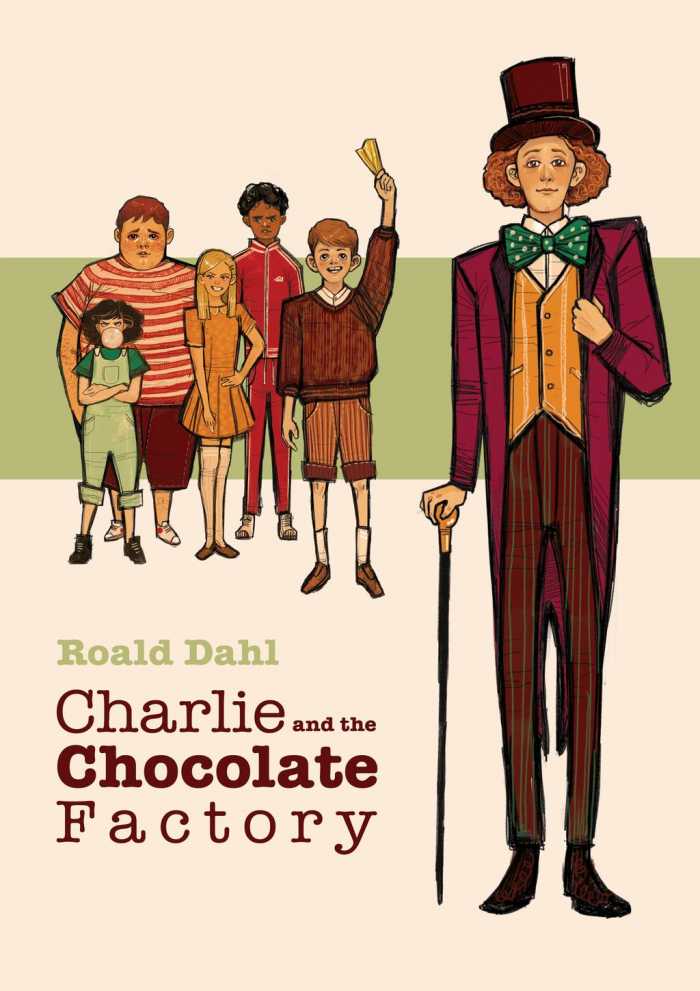
The children are guided through the factory tour by the colourful Mr. Willy Wonka. However, it becomes clear that, unbeknown to them, the kids are being tested. As they progress, they are picked off one by one. Giving in to greed and unnecessary wants, each child is painfully removed from the tour. That is until only one boy is left: Charlie Bucket. In a surprising twist, for being the last man standing, Charlie wins the entire factory. Mr. Wonka bequeaths his company and associated fortune to the youngest Bucket. He admits that this was the point of his competition all along.
This beloved story is sprinkled with ample colour and features that ought to amaze; a chocolate river, gum that feeds you a three-course meal, and everlasting gobstoppers!
But for all of the awe and wonderment of this story, Dahl’s book is surprisingly dark. As this article will explore, several aspects of Charlie and the Chocolate Factory imply that the story takes place within a capitalist dystopia. This fictional universe might read like a sugar-frenzied utopia, but several facets of the story world suggest the opposite. Moving beyond mere fiction though, parallels can be drawn between many of the darkest aspects of this story and real-world examples of injustice. Thus, under the guise of a fun children’s tale, Dahl’s text can be interpreted as a reflection of some of humans’ greatest injustices. The book is subtly and cleverly political, so as not to compromise the enjoyment of its intended audience.
Though there have been two film adaptations of this text, both of which approach the story in different ways, this article does not delve into them. The focus of this article is solely on Dahl’s original book.
Wonka the Fat Cat
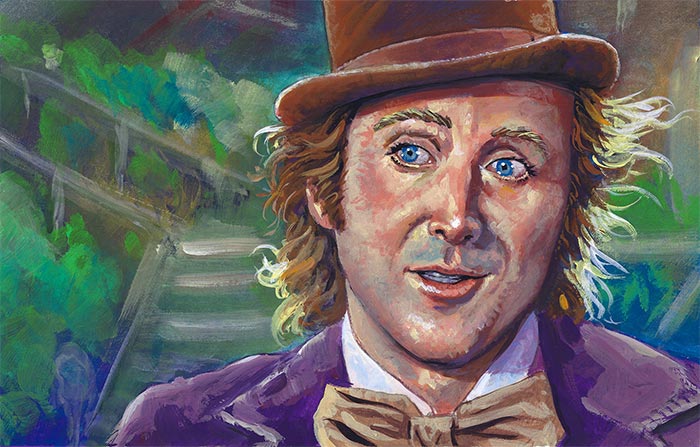
The story of Charlie and the Chocolate Factory is arguably best known for the character of Willy Wonka. He’s an odd and wonderful man who often finds himself the subject of speculation. He is the exact kind of caricature that children’s literature demands. Despite this, rather than a charismatic and quirky chocolate connoisseur, Dahl’s Wonka is akin to a money-hungry CEO of a transnational corporation.
Looming large within a residential area is Wonka’s expansive chocolate factory — the “smoke belching from its chimneys” a symbol for the pollution its very existence is responsible for. This factory is the biggest factory in the entire world, fifty times larger than any other. The chocolate that is churned out by Wonka is sent to “all the four corners of the earth.” The wacky businessman appears fixated on one idea: changing the world. He aims to conquer with his sweet inventions.
Wonka’s business is so successful, and his products so sought after, that he finds himself the victim of corporate espionage. Several employees turn out to be spies from competing chocolate companies. “I shall be ruined!” is Wonka’s response to learning of this, for nothing would be so bad than him losing out on profit.
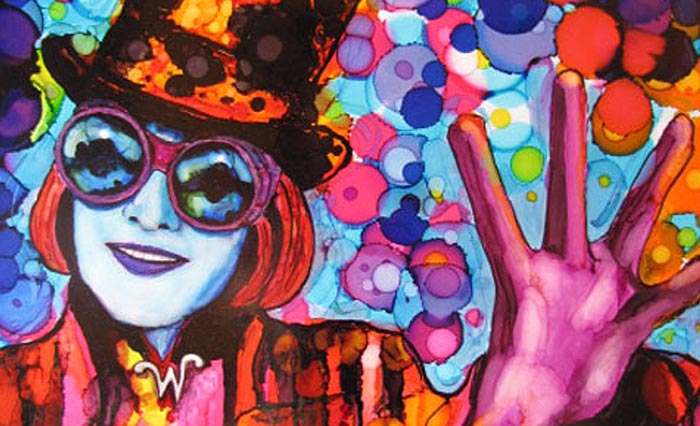
Mr. Wonka is undeniably greedy. Fabulously wealthy and idolised by all, this does not seem to be enough for the quirky businessman. Hence, the Golden Ticket competition is created. Hidden within five of Willy Wonka’s chocolate bars is a golden ticket. The children that find these tickets are given the sought after prize of touring Wonka’s factory. The family of the titular character, Charlie Bucket, respond to this news as such:
“‘He’s brilliant!…He’s a magician! Just imagine what will happen now! The whole world will be searching for those Golden Tickets! Everyone will be buying Wonka’s chocolate bars in the hope of finding one! He’ll sell more than ever before! Oh, how exciting it would be to find one!’”
The Buckets can see this scheme for what it really is — a shameless cash-grab. Yet, they remain unperturbed. Within this fictional dystopia, Wonka’s wealth is not perceived as unfairly disproportionate. He does not receive criticism for hoarding great wealth; instead, he is admired. Wonka’s affluence is perceived by the lower classes as an ideal and something to aspire to. They have been brainwashed by their society’s ever-growing consumer culture.
Willy Wonka’s greedy, yet guilt-free, existence is true to the real-world. The richest members of society are often looked upon with admiration, rather than disdain. Blinded by charisma and glamour, the richest people are often forgiven for their unnecessary wealth. This is the same dynamic presented in Charlie and the Chocolate Factory. Characters and readers alike fail to see past the majesty of Wonka to the unfair hoarding of wealth that he is responsible for. The unfairness of Wonka is felt most, yet remains unacknowledged, by those who work for him.
The Working Poor
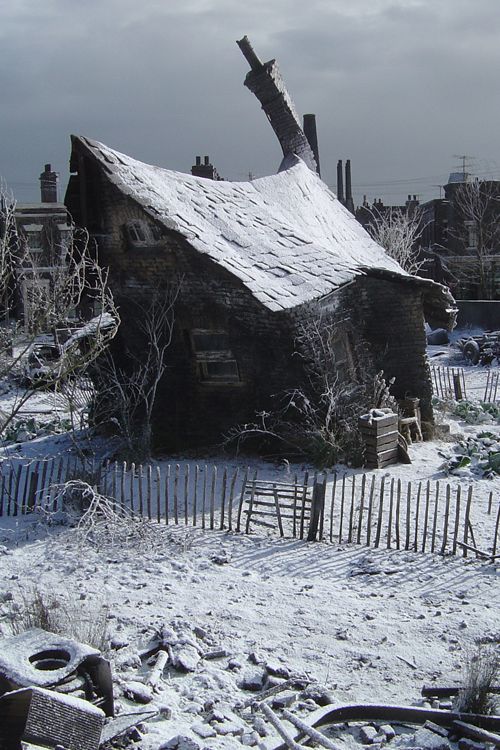
Throughout Charlie and the Chocolate Factory, a spotlight is placed on the socioeconomic status of the titular character. The first twelve chapters, comprising almost half of the book, detail the struggles faced by little Charlie Bucket and his family. Mr. Bucket is the only working member of the family. He works in a factory. His role is minor, yet vital; he screws caps onto toothpaste containers. While he is not an employee of Wonka’s factory, his working conditions would resemble those of the workers employed by Mr. Wonka. Thus, parallels can be drawn between the two.
This factory job is never enough to ensure that the Bucket family has access to their basic human needs. Adequate food, shelter, and healthcare must all be forgone by the family. The narrator notes:
“However hard he worked, and however fast he screwed on the caps, was never able to make enough to buy one half of the things that so large a family needed.”
The family’s living arrangement is a significant complication. Charlie, his two parents, and four grandparents all live together in the same small house comprising of only two rooms and one bed. All four grandparents share the bed, whilst Charlie and his parents sleep on mattresses on the floor. This is an acceptable arrangement in summer, but during snowy winters the family truly suffer.
The family can also only afford the smallest, plainest meals. Much of the family border on malnourishment. Their diets consist almost entirely of cabbage, and they spend whole days “with a horrible empty feeling in their tummies.” One chapter of Dahl’s book is titled ‘The Family Begins to Starve.’ Within this chapter, it is stated that Charlie grows so thin that he begins to resemble a skeleton. He had to make changes, like walking slowly to school or sitting inside during playtime, to simply avoid exhaustion.
The family are also unable to provide sufficient healthcare for their grandparents. On the other hand, the family can barely afford to provide care to the four elders themselves. Thus, any quality of life for the grandparents is lost. They are forced to spend every hour of every day crammed in bed.
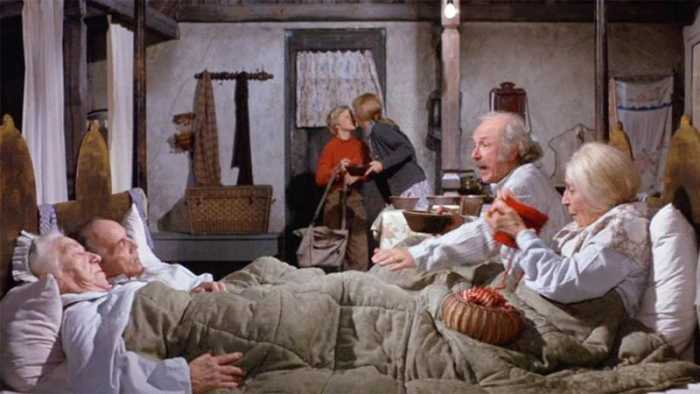
Comparing the lavish lifestyle of Wonka and the impoverished living conditions of the Buckets creates an uncomfortable juxtaposition. These two lives, unfolding within the same neighbourhood, demonstrate how dramatic the pay divide is. Despite the wealth of Wonka, and other factory owners, their workers receive relatively little pay. In the case of the Buckets, this pay is life-threateningly scant. The hardest workers, like Mr. Bucket, are those that lose out most in this capitalist world run by people like Wonka.
Minimal pay is not the only problem here, though. Within this short book, readers witness two accounts of job precariousness. Due to the previously mentioned corporate spies, Wonka fires his entire crew. Similarly, Mr. Bucket’s factory is forced to close and he is unable to find another job. Without care, potentially hundreds of people are forced into economic uncertainty by the actions of the wealthy. In this fictional universe, the richest people care very little for those who are keeping them in their positions of wealth.
This is contextually relevant within Britain in the 1960s. Despite the growing belief that inequality was decreasing, by 1960, 18% of UK households were in poverty. 2 Close to half of those in poverty relied solely upon earnings for day-to-day expenses. Large family sizes were determined to be a significant cause for this situation. 3 The portrayal of Charlie’s family aligns with these statistics. Thus, poverty within Dahl’s story-world befits both a fictional dystopia and the real world.
Labour Exploitation
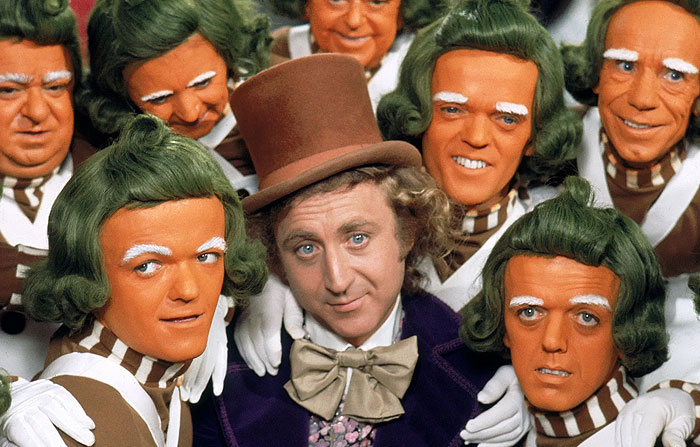
If dangerously underpaying workers was not bad enough, Wonka is also guilty of a practice far worse. The Oompa-Loompas who work in the chocolate factory resemble indentured labourers. These characters appear just another quirk of Dahl’s zany story-world, however, reading how Wonka recruits them is rather alarming.
Mr. Wonka’s solution to the spy problem is to fire all of his staff, and bring foreign workers into the country to work for him. The Oompa-Loompas, according to Wonka, are “imported direct from Loompaland.” During a visit to this country, Mr. Wonka observes the struggles of its citizens. Thus, he propositions the Oompa-Loompas, and makes the following offer:
“Look here, if you and all your people will come back to my country and live in my factory, you can have all the cacao beans you want! I’ve got mountains of them in my storehouses! You can have cacao beans for every meal! You can gorge yourselves silly on them! I’ll even pay your wages in cacao beans if you wish!”
Here, one can deduce meaning from details that are omitted. The fact that they will work for him is never explicitly mentioned in this exchange. Despite this, the Oompa-Loompas agree and Willy Wonka ships their entire tribe to his factory. In fact, he smuggles them into the country.
Present within this interaction is the historically common Western narrative that those from non-Western countries need saving. Loompaland is described by supposed-saviour Wonka as “terrible” and full of dangerous jungles. Moreover, the Oompa-Loompas are depicted as exotic and different to the country they have been brought to: “the women wear leaves, and the children wear nothing at all.” They are treated as inherently inferior to Wonka — and not just in the way that there exists a natural hierarchy between employer and employees. Like an animal, to get an Oompa-Loompa’s attention, Wonka “clicked his fingers sharply, click, click, click, three times.” The worker appeared at his side immediately.
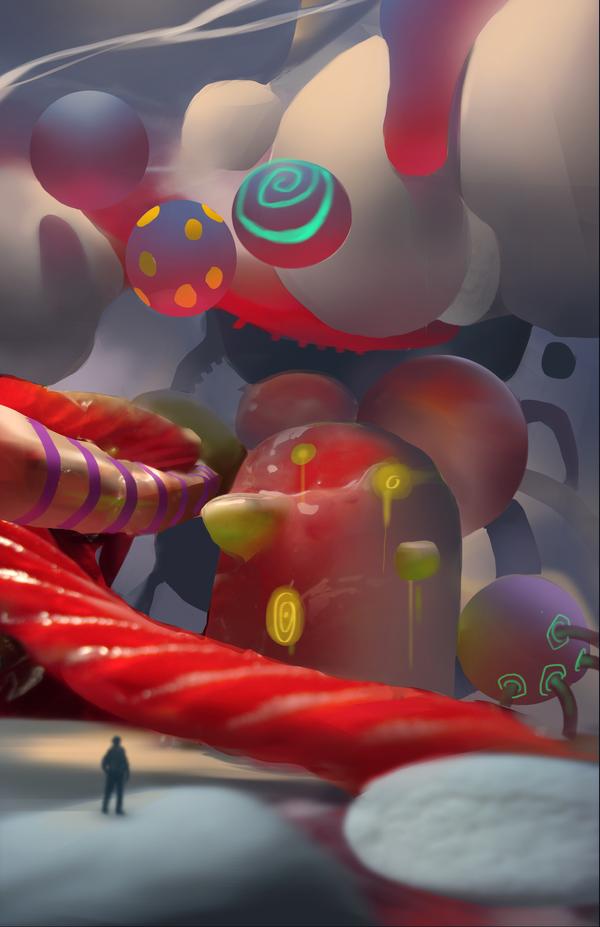
If this were not bad enough, Wonka appears responsible for the cultural imperialism of the Oompa-Loompa tribe. Despite Wonka speaking their language when he initially visits Loompaland, when they are brought to live in the factory they are forced to learn English. This is expressed nonchalantly by Wonka, who states “they all speak English now” in passing. It seems Wonka has deliberately replaced their native language with his own.
Much of this seems remarkably similar to a period of Britain’s history. After the Abolition of the Slave Trade Act was passed in Britain in 1807, the country ‘reworked’ the practice of slavery — indentured labour was the result. Initially, labourers were sourced from India. They were sent to various British colonies to work predominantly on sugar plantations. They were bound by five year contracts, of which many were unable to read. Many workers were coerced into such an agreement. These workers were paid considerably less than British labourers. 4 A similar practice occurred in the British Colony of Queensland (pre-Federation Australia). Men from the South Sea Islands were kidnapped or coerced into labour on sugar plantations. These men were treated akin to slaves, often succumbing to malnutrition and various European diseases. 5
The treatment of the Oompa-Loompas is definitely less severe, but, there are several similarities. Like indentured labourers, the Oompa-Loompas were not necessarily fully informed of what they were agreeing to. In that initial conversation, Wonka does not mention the word ‘work.’ The Oompa-Loompas are also not paid appropriately — rather than an acceptable working wage, they are paid in cacao beans. Finally, one might assume that the Oompa-Loompas are unable to leave. They have only ever lived inside the sheltered environment of the factory and know nothing else of the country they now live in. Psychologically, they are bound to Mr. Wonka.
Interpreting the Oompa-Loompas as undertaking a form of indentured servitude further establishes Dahl’s story-world as a capitalist dystopia. Wonka, a man with power, readily exploits humans, solely for profit. Worse still, the visitors to his factory remain unperturbed by this exploitation. This signals an acceptance of Wonka’s behaviour, implying that this injustice is normal.
Disproportionate Wealth: A Vicious Cycle
Moving away from the misdeeds of Mr. Willy Wonka, Dahl’s book is fraught with money-hungry characters shamelessly flaunting their moral ambiguity. Every child and parent who enters the factory with Charlie is depicted harshly by Dahl.
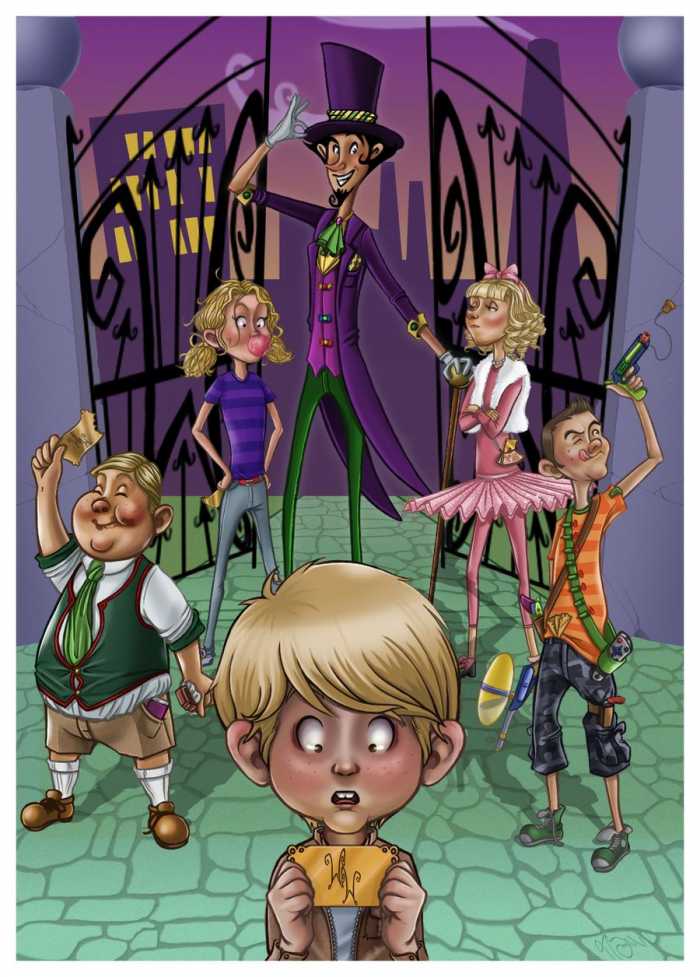
Amongst the greedy children is Augustus Gloop, a boy who eats numerous bars of chocolate a day. In fact, it is stated that eating is his main hobby. His mother enables him by claiming that he would not eat as much as he did “unless he needed nourishment.”
Another child is Veruca Salt, a young girl who can get anything she wants simply by telling her wealthy father she wants it. In order to secure her a golden ticket, Mr. Salt bought thousands of Wonka bars and forced his factory workers to spend days tearing them open. Until a chocolate bar was uncovered, young Veruca “would lie for hours on the floor, kicking and yelling in the most disturbing way.” To this day, this character is often synonymous with childish greed.
If this behaviour were not already odious to the reader, the Buckets, who are increasingly depicted as the novel’s moral compass, pass astute judgements on these people. One child is described as “beastly” while another is labelled a “brat.” Personal distaste aside, the elderly Buckets also observe an inherent flaw in the consumer culture they live in:
“‘The kids who are going to find the Golden Tickets are the ones who can afford to buy bars of chocolate every day. Our Charlie gets only one a year. There isn’t a hope.’”
Put simply, the rich get richer. The Buckets, or others in their position, could benefit from the tour and the lifetime supply of food, more so than any of the other winners. Yet, it is people like the Buckets who are least enabled to access such a benefit. Part of this fictional dystopia is the need for rampant consumerism — a vicious circle that continues to reward the wealthy.
Adding to this greed though is extreme wastage, and this extends further than just the small circle of competition winners. At one point, Mr. Wonka is commissioned to build an entire palace out of chocolate. The structure is truly decadent:
“It had one hundred rooms, and everything was made of either dark or light chocolate! The bricks were chocolate, and the cement holding them together was chocolate, and the windows were chocolate, and all the walls and ceilings were made of chocolate, so were the carpets and the pictures and the furniture and the beds; and when you turned on the taps in the bathroom, hot chocolate came pouring out.”
The Prince who is gifted this bizarre new home refuses to eat it, despite being told it will melt. Naturally, after hot weather “the whole palace began to melt, and then it sank slowly to the ground.” The unfairness is staggering; The Buckets cannot afford a single bar of chocolate, yet a single man is able to afford an entire palace made of chocolate, and does not care that it is wasteful.
Looking to the present day, food wastage is a significant global problem. Despite the fact that enough food is produced to feed the whole world, one in nine people do not have access to enough food. This is due to wastage, as one third of all food produced globally is lost or thrown out. 6 This is another point in which an alarming facet of this fictional dystopia aligns with the real-world.
Looking, again, to the Buckets, nobody cares that they are struggling, despite many having the means to help. In fact, Charlie is bullied and called a “shrimp” for being malnourished. Thus, the idea that this fictional world is a dystopia is solidified through highlighting the cruelty of society’s upper echelons. Wealth and greed are synonymous, and ignoring those in need helps to propel this. The dichotomy that the author has created between rich and poor is unmistakeable.
Children are the Future
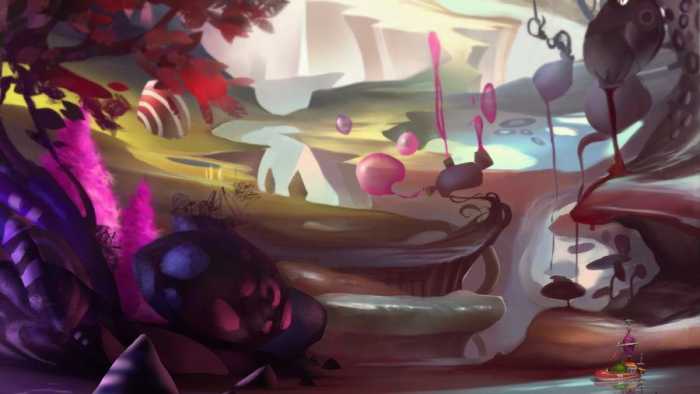
The world depicted in Charlie and the Chocolate Factory is certainly bleak. This capitalist dystopia is not devoid of hope, though. The world is not improved within the confines of the story, but a brighter future is hinted at for these fictional beings. The harbinger of such hope are the same people who this book is targeted to: children.
In a world where the adults have created this capitalist dystopia, children are offered as the solution to these problems. At the book’s conclusion, Wonka’s plan is revealed. In getting children to tour his factory, he was seeking the next owner. He tells Charlie:
“There are thousands of clever men who would give anything for the chance to come in and take over from me, but I don’t want that sort of person. I don’t want a grown-up person at all. A grown-up won’t listen to me; he won’t learn. He will try to do things his own way and not mine. So I have to have a child. I want a good sensible loving child, one to whom I can tell all my most precious sweet-making secrets – while I am still alive.”
Charlie is the ideal winner as he is well-behaved and generous. He is the antithesis to the darkest aspects of this story universe. He is best equipped to run this business most amicably. Rather than show greed, he shares his one chocolate bar a year with his family. When touring the factory, he follows the rules and does not ask for anything excessive, unlike every other child. He shows concern by offering his food to his mother, even when he needs the sustenance just as much.
The well known, kid-friendly lesson embedded in Charlie and the Chocolate Factory, good children are rewarded and bad children are punished, fits neatly within this dystopia. However, when looking at the text closer, these so-called good children are also presented as saviours within this unhappy fictional universe.
Children’s media is often constructed cleverly, allowing adults to find separate meaning underneath the child-friendly aspects of a story. Charlie and the Chocolate Factory is no exception. For the adult reader, the injustices present within this story are unmissable. From dire poverty to labour exploitation, Dahl’s text can be interpreted as a dystopian story.
The inherent charisma of Willy Wonka or his Oompa-Loompas appeals to children, so much so that the story is still popular after fifty years. For the reader who enjoyed this story as a child, returning to it as an adult can be surprising. The unabashed depiction of an unjust world, fuelled by capitalist ideals, would be equally as fitting within a story targeted to adults. Whether the reflection of a real-world society, or a purely fictional construction, the story world of Charlie and the Chocolate Factory can be interpreted as a capitalist dystopia. Most concerning about Dahl’s book, however, is the extent to which this dystopia resembles the real world.
Works Cited
- Dahl, R 2016, Charlie and the Chocolate Factory, Penguin UK, London. Print. ↩
- Thane, P 2018, ‘Poverty in the Divided Kingdom’, History & Policy [webpage], http://www.historyandpolicy.org/policy-papers/papers/poverty-in-the-divided-kingdom. ↩
- Ibid. ↩
- Gregoire, P 2018, ‘Indentured Labour in the British Empire: Slavery Reworked’, Sydney Criminal Lawyers [webpage], https://www.sydneycriminallawyers.com.au/blog/indentured-labour-in-the-british-empire-slavery-reworked/. ↩
- Ibid. ↩
- Oz Harvest 2020, ‘Food Waste Facts’, Oz Harvest [webpage], https://www.ozharvest.org/what-we-do/environment-facts/. ↩
What do you think? Leave a comment.











I loved that you referred to the original text for this analysis! It really portrays Willy Wonka in a subtly-suspect light, rather than the lovably eccentric manner with which he is often solely portrayed in the film adaptations. Watching the fates of the “bad children,” which were often left to the viewer’s imagination, definitely frightened me as a child. Roald Dahl was a master at crafting the stuff of nightmares for children (or at least harnessing and tackling how frightening the world can appear when one is a child). Nice work, Samantha!
Thank you for your feedback! Until I had attempted to write this article, I had never read the original (but had seen both films many times). I was genuinely surprised by how dark it was.
After reading this article, I see Willy Wonka in a different light.
Still my favourite Roald Dahl book.
i always thought he was strange…
This was a really interesting read. While I think we all know what Roald Dahl’s intent was when writing the book, that doesn’t change the fact that book is a product of our culture, and or culture has social norms that we have a blindspot for and don’t notice as alarming.
I wouldn’t say the book is capitalist propaganda but I do believe that this book was made in a capitalist environment, and so the book (much like us) normalizes behaviors and beliefs that are actually quite harmful and are distinct markers of a capitalist belief system. Did Roald Dahl set out to make a story about celebrating “benevolent” billionaires? No. But could you argue that that’s what happened? Based on this article, I’d say yeah you could.
I always enjoy reading about interpretations of old media through new lenses, so thanks for writing this. It’s an interesting thing to mull over, and it’s kinda fun to examine how capitalist ideals exist in our seemingly benign children’s stories that we once held dear. It’s like being a cultural anthropologist for your own culture.
Why do people insist that every work of fiction be judged by how much it puts a critical lens up to society? Is it not allowed for someone to come up with an interesting setting and some characters and just tell a fucking story that is entertaining?
Reading is just as much about the reader as it is the writer. It is the reader’s prerogative to make meaning within a text, even if the writer never intended it. So, sure, some read solely for entertainment and that is completely fine. But others read to make meaning, and if that means finding a critical judgement of society within every text, that is also wholly fine.
I agree that not every story has to take a critical lens of the society it’s born from, but it is fascinating to see how some of our more nefarious capitalist ideals are present in media—sometimes in an alarming way. Take the idea of the “morally good poor person who will be granted wealth and success simply because he is good at heart.” On one hand you’re saying to children, “be good and you will receive good things”. That’s a great story to tell kids. We want to incentivize good behavior. But charlie isn’t just a GOOD kid. He’s also a poor kid, and he’s being given money by a “benevolent billionaire” (who Charlie and Uncle Joe stan hard for) and the billionaire is giving them money because of their “goodness”, not because they’re starving. In a society where we should care for our sick and poor regardless of their morality, this comes off as a meritocracy for financial aid. I don’t think it was Dahl’s intent, but it’s a fascinating byproduct of our capitalist meritocracy mindset.
Bad people shouldn’t be punished, they should be helped and encouraged to be better people, and poor people shouldn’t be awarded wealth for good behavior, they should be supported because people shouldn’t have to go hungry. It wasn’t Dahl’s intent to create a piece that supports capitalist ideals, but it’s an interesting consequence of being a part of a capitalist society, and I found the article interesting as it asked me to look at a well loved story from a very different perspective.
Very well written comment.
Because it’s fun, basically. The idea that you’re supposed to “just enjoy the story” and that looking deeply is bad/a waste of time is just very, very boring to me. Deep dives into children’s literature is fascinating because, whether intended to or not, the books we read to children can tell you a lot about what society’s values are at the time the book was written. It’s not the like author was outraged or anything; this was clearly just a fun thought exercise, asking the reader to take a closer look at a piece of media they may not have looked too closely into before.
It’s important to view things with a critical eye. It’s less important to always take an interpretation as sacrosanct – give me about twenty minutes and I could pound out a 500 word essay about how the movie regarding a chocolate mogul offering the literal means of his production to any working class kid that can find a ticket is, in fact, the height of Marxism.
I don’t think anyone watched Willy Wonka and thought “Hell yeah, I better exploit labor to produce heroin” but it’s still a perspective the author can support with the text. And there’s many, many more pieces of media that are much worse about the things they tacitly support that do need a critical eye applied. Ultimately it makes no difference, popular culture that’s that popular will never be cast aside from one person’s critique, but I bet you’ve never really considered economics in this specific application until this article. Maybe of dubious utility, but for someone else it can be a path to understanding and refining their own perspectives.
I agree with you that it may be unreasonable to demand that children’s stories tackle all the mentioned societal issues but at the same time, these stories also help children to question the very real double standards that exist in the real world.
Hot damn – covering the novel which got me into reading. This is extremely well-put-together. I can see that you put quite a lot of work into this, and best of all: it makes perfect sense. This is what The Artifice is for.
Thank you so much for your kind words! It is always interesting to look back upon childhood favourites as an adult and pick up on all of the things we overlooked in our youth.
I never liked Dahl’s books: there is a streak of sadism in them which always put me off.
I suspect that it is exactly that which attracts most children.
Indeed, I can’t imagine something like The Twits being published today. It would probably be condemned for glorifying domestic violence or something. I think that’s a real shame for todays kids.
I always thought that it seemed to be a story to give kids that slight tingle of fear and excitement that kids love. Having recently read Danny Champion of the World with my daughter I struck me that Dahl was by no means a traditional moralist or defender of the landed classes…
Wilder’s Wonka creeped me out, and it never sat right with me that he punished the kids but spared the indulgent parents.
That said, some of my happiest memories of raising my own kids come from reading Revolting Rhymes to them at bath time and the stories at bed time. My world would be a much poorer place without Dahl’s writings.
If you lived in Australia you wouldn’t be able to buy Revolting Rhymes from Aldi. A customer complained about the use of the word “slut” in Cinderella as being unsuitable for children, so Aldi took it off the shelves.
I’ve never liked Roald Dahl. Growing up in the sixties and seventies he came across as bad news for anyone of a liberal disposition because he made it clear in interviews that he was a strong supporter of Thatcher and he disapproved of the social changes of the sixties and seventies. He seemed to be one of those people who was something of a maverick and a contrarian but ultimately admired conventional behaviour and discipline. He was a strong advocate of a return to national service.
Having said all that, it is no reason to dismiss his writings. You don’t have to agree with someone’s politics to appreciate their art. When I was a young I was a great fan of Just William and I still can appreciate the books now although research has told me that Richmal Crompton herself was very right wing and deeply conservative.
The fashion for Roald Dahl did not emerge until I became an adult so in some respects my first encounter with him came with the films and reading ‘The Twits` to my son when he was young. I can remember giving up on the book because I was wearying of the misanthropic view of the world that the book presented. Other people have told me endlessly that children like this standpoint but I’m obviously missing something here. Great imagination but ultimately a deeply conservative world view which of course chimes well with the conservative world that has endured for the last thirty five years.
Thank you for reading and thank you for the writeup.
Glad I’m not the only one. I always detested Dahl as a child.
Wonka was a control freaking capitalist.
Which is why I think the Burton movie was a better rendition of that aspect of the story than the earlier version, since it gives Wonka a “tragic” background story that is eventually resolved and helps explain his personality quirks. It’s still not terribly convincing, but it does partially redeem him.
The Tim Burton film was much closer to how I imagined the book in my head as a child. I hated the Wilder version the first time I saw it.
Saw the Musical during a recent visit to London with my 11 year old grand daughter and we both loved it. What really made it for me and brought a round of applause, was Willy W. singing the song from the Gene Wilder versión towards the end. Personally I loathed J. Depp’s interpetation of the charácter as well as what he and T. Burton did to the Mad Hatter.
Dahl hated the first film, even thought he was the credited script writer. I once had the pleasure of meeting him (I ran a bookshop at the time, and he came to do a signing session for us) and he still spoke (15 years later) with great bitterness about what a travesty he thought it.
My signed copies of “Charlie” and “Matilda” are treasured possessions to this day.
I never knew this! From what I have seen, the first film definitely deviates further from the original than the second film does. So, I suppose it makes sense he would dislike it.
Well he was right tho the Tim Burton/Depp film was appalling too. You are fortunate to have the signed copies.
Oh wow! Lucky you.
I love both films, especially the 1971 film, though I see them as distinct to the book.
Dahl is treasured by children both young and old; an awesome writer.
And I can’t imagine Dahl without Quentin Blake’s fabulous illustrations. A match made in heaven!
“Dahl hated the first film, even thought he was the credited script writer.”
I believe it was because it focused too much on Wonka and not enough on Charlie. Also I hated the bit at the end where WW is reluctant to give the factory to Charlie when in the book he said it had been his intention all along.
He no doubt would have disliked the remake had he lived (as many of us do.)
Both Wilder and Depp play the essential creepiness of Willy Wonka very successfully. Seeing his creation depicted in this way must have been quite a shock. I wonder if before this Dahl altogether realised how Wonka — in many ways a self-portrait of the artist as control-freak — came over to other people.
I think you are completely right. That so-called ‘creepiness’ is essential to the character of Wonka. It is evident in the book and both films.
Read his short stories and biographies for adults. He had a truly amazing life and wrote many of his stories from experience. All of them have a movie in them, hopefully done properly.
I really enjoyed your analysis of the book. I had never thought of it in that light, but you did a great job of connecting the dots.
Such a creepy movie. Not read the book yet.
We were made to watch this movie at school for its “virtues”, but it made no sense that every family was bad while Charlie’s was glorified. I remember feeling unsettled, I could never put my finger on it… But this article has put some perspective into it.
The dystopia described in the book seems to be that of a Victorian/Edwardian Britain as some details suggest. This also shows the marketing strategy of a book for adults but marketed to children, as the adults of the ‘60s would definitely have been familiar with this kind of world.
I commend the thorough analysis. The treatment of the Oompa Loompas and the commentary on wealth seem particularly relevant for today. I also wonder if Wonka’s chocolate doesn’t function as a symbol of wealth and power, or for the children, privilege, safety, and the power they one day hope to have.This article makes me think books like Charlie and the Chocolate Factory are not as “childish” as they seem at face value. Perhaps books like this should be studied or held up as examples in subjects like sociology or economics.
I’ve seen commentary on the Charlie and the Chocolate Factory story that suggests that Wonka had always intended to give the factory to Charlie, right from the very beginning (there are some fans who even suggest that he is secretly Charlie’s real father). The other children were brought simply to obscure Wonka’s true intentions, and to punish their parents for their improper childrearing practices.
Indeed, that is how I figured that Wonka was the eccentric wizard/scholar who picked a commoner as his ward.
Considering that Dahl’s work is considered to be problematic by some critics, the way you’ve interpreted it makes view Dahl in a new light. How much of received wisdom did I take for granted ?
This essay was well worth the wait. Thank you for this.
Dahl was just emphasizing a lot of evil and turned it into a story. It is a satire, it shows and in a back-handed way criticizes many things that are wrong in society. The way it was done and portrayed belongs to another era, it would no longer work and be tolerated today.
Wow, you really ruined this book for me! Really fun thought exercise, despite that outcome.
In reality, Charlie will not be happy. This young, sweet boy has been forced into a situation where he must choose between abject poverty or perpetuating the exploitative system that produced his abject poverty. Will he release the Everlasting Gobstoppers? Will he free the Oompa Loompas? Will he use his vast wealth to help people who live in squalor, as he did? He will, as a pre-teen, have to grapple with these questions. Charlie will not live happily ever after. The capitalist myth is a lie. Wonka has given him nothing but misery.
I always thought that Wonka was responsible for Charlie’s poverty, by shutting the factory, getting rid of the workers and ruining the economy of the town.
That is really interesting, and I would say totally plausible. I had never considered that.
What a bastard he was.
His books are what made my transition from picture books to short novels so much more enjoyable. I think the first I read was Matilda or BFG. Absolutely loved his vivid imagination and wonders he would create.
I think you’re reading too much into it if you think this book has anything to say about capitalism.
And it is in Wonka’s character to be very enigmatic, it builds the suspense and curiosity of the reader as this unseen character finally makes his entrance.
Some guy who shuts himself off from the world for years is going to be strange.
Are you Willy Wonka’s attorney?
Wow! This is an incredible article. I love Dahl and have found his adult short stories filled with meaning. I reread most of his kid books when by children were small and love Matilda and its depiction of school (I’m a teacher). However, I skipped Charlie because of the movies. I will revisit it and share your article. Fantastic!
‘Charlie’ is the book that made me want to read LOTS of books.
Willy Wonka’s entire business is detrimental to the society’s health.
He pours chocolate and candies onto the masses for huge profit at the cost of his customer’s well being. Preying on the poor, whose diets are most likely not the best already, will cause obesity, tooth decay, diabetes, heart degradation, and many more health issues amongst the lowest classes. This in turn will cost society as a whole a lot more money than initially needed.
Wonka does not invest into health programs, he does not encourage responsible or healthy eating habits, he instead focuses on these crazy candy oddities that only adds to his lore (like the story about his ice cream cone that never melts). His product is enjoyed by all classes thus there is much less desire to slow his chocolate empire (a bread and circus situation).
Really strong social commentary. Hot damn. This is extremely well-put-together. I can see that you put quite a lot of work into this, and best of all: it makes perfect sense. This is what the subreddit is for.
I agree — when you look past all of the bright, colourful, and fun parts of the story, it can really read as quite dark. I find it surprising just how dark it often is.
I love that movie but have always hated the way it seems to make the poor look up to the rich and how it seems to paint a picture where rich people are compassionate and brilliant people who therefore deserve their wealth. Don’t like the Jonny DepP version though.
In my opinion, the Depp version is closer to the original text. Wilder’s Wonka seems.. less problematic, maybe? than Dahl’s original. So, based on your opinion of Depp’s Wonka, I would be intrigued to know if you would enjoy the book or not.
I disagree – I don’t think that movie makes rich people look compassionate or brilliant. If anything, the only people humanized in it are Charlie and his family. Wonka is sort of an outlier in that he appears to have morality, unlike the rest of the richies in the movie, but he also appears to have been driven mad and deeply bordering on sadistically moralistic.
Keep in mind, for reference, that Roald Dahl was something of a misanthrope, as a writer anyway.
An insightful, informative and well written article.
Burton’s adaptation for the screen was much darker and on point than the original screenplay adaptation of Dahl’s classic.
You wrote a really interesting article. I`ve got some insights through reading. I like the way you write too.
Thank you! 🙂
All I can say is god damn I’m glad the internet didn’t exist to preserve my hot takes when I was a 22 year old know-it-all.
Yes some bits of the book haven’t aged well, and Dahl was a product of his society, but overall I wouldn’t be the person I am today without his books, particular Danny the Champion of the World which taught that the rich are a-holes and monsters who will do whatever they want to whoever they wish for as long as they’re allowed to do so. A lesson we all can appreciate today.
Interesting theory! I need to go back and read/rewatch it now!
What a beautifully written, insightful article. I really loved reading Roald Dahl’s books as a kid.
Highly informative piece!
This is great, it highlights the power of narrative as a way of commenting indirectly on the realities of our present and such an approach reaches its zenith in the work of someone like Roald Dahl (do Fantastic Mr Fox next).
I would, however, challenge the portrayal of what the article terms ‘mere fiction’. I think that it would be productive to consider fictional portrayals on the same level as their non-fictional equivalent. I don’t think that fiction as a form of narrative is any less effective (as this article has shown) at conveying the realities of the world. In fact, I would say that it regularly engages at a level that exceeds it’s non-fictional equivalents, such as the essay. This is particularly relevant in the context of the themes in which the article and Dahl’s text explore: capitalism, exploitation, the plight of children, etc., where the individuals involved are suppressed to the point of being unable to offer an authoritative opinion.
Thrilling exegesis, love it.
Very insightful piece. Very well written and accessible, with solid points supporting your claims. As a child, I naturally found the Oompa-Loompas to be akin to a different meaning as you explored here. Your conclusion does cause me to wonder. While similar to the real world, we aren’t always fortunate to have “happy endings”, and Dahl’s writing style does make me curious if Charlie lost. Would the message shift from good kids get rewarded to be good for the sake of the world?
Good article and I am very impressed with this article, allow me to recommend this website to my friends.
Great article. I think there definitely is a certain amount of intentionality behind the choices in the book and movie.
Your writing power is great appreciated.
You’re on point with the parallels between Oompa-Loompas and post-emancipation indentured labourers. In the first edition of Charlie and the Chocolate Factory, the Oompa-Loompas were depicted as a tribe of African pygmies from “the very deepest and darkest part of the African jungle where no white man had been before.”
Apparently, the book’s initial publishers didn’t consider the racist undertones because they considered this portrayal part of a “very English fantasy.” Make of that what you will.
Great article! This is definitely something that you only really start to become aware of as you get older. This story transcends ‘children’s literature’ for sure.
Great read! Do you think there’s anything to gain from the mooted Wonka origins movie being talked about? Or would it just be a cash grab?
I genuinely have no idea! From what I have read/heard it seems like it might just be a whimsical tale. Though, I am certainly curious to see what “adventures” they conjure as being important to the back story of Wonka.
It’s something I never noticed as a kid but going back and reading over Roald Dahl’s work, there’s a lot of elements in them that work to create a macabre atmosphere beneath a shiny gilded surface of childlike wonder. I personally have always shuddered at the idea of living in a world like Charlie and the Chocolate Factory — where wanton capitalism and sheer excess of personality aren’t scrutinized, but given a theme-park. Oh wait, that’s Disneyland!
The striking thing is this world seems like a utopia to kids, the target audience of the book. We don’t realize just how shafted the working class adults are until we grow up and experience the workforce ourselves. Many books and movies are like that. If you watched the Matrix through the eyes of a regular person, not a friend of the Chosen One, it would look like Keanu Reeves going on a murder spree. Gaston absolutely thinks he’s the dashing hero saving a Beauty from a Beast. Heck, go watch Rosencrantz and Guildenstern are Dead or The Lion King 1 1/2.
I had never considered this point of view. Charlie and the Chocolate Factory always seemed like a dream come true – who would not want to run a place that is essentially all about chocolate? Thank you for this insightful piece!
great article – workers of the world unite
Interesting article. While I have seen many posts on social media pointing out various aspects of the capitalism, I’ve never seen any go so in-depth.
very interesting take! the book was always a little creepy to me
I enjoy how this article focuses on the economic aspects that are not so explicit in Dahl’s story, yet they determine the plot and its outcome. I’ve always found funny how the story cuts no expenses when it comes to describe the money struggles the Buckets go through every single day (starvation, frustration, disability), but there is no mention of the economic wealth and power Wonka has, or how he came to build his fortune.
One of my favorite articles; glad to see it made the lineup.
Absolutely a fantastic article – very interesting. Thanks for writing it!
I remember reading Roald Dahl’s books as a kid and mostly just being scared by them but having read this article I’m thinking they need a re-read now that I’m a socially aware adult. I knew that there was commentary happening on the excess and indulgence shown in Willy Wonka but this is such a great insight into the depth of the stories. Thankyou for writing it.
Love this article! Kept me hooked the entire time…thanks for writing it!!
I have been saying for YEARS that Wonka is actually a psychological-thriller movie. Imagine if that happened to you– you go into a huge candy factory and you slightly mess up by eating the one candy you apparently weren’t allowed to touch, and now you’re purple for the rest of your life.
Wonka is just not a good guy. He coerced the oompa loompas to work for him, he took away their cultural identity, he fired hundreds of people over his trust issues, and he almost killed 4 kids. He’s a power-hungry monopoly and nobody can check him. That’s a terrifying dystopia concept right there. I mean, Dahl wrote this book to recover from a heartbreak… so I guess it makes sense that the story is actually super dark when you dig deeper.
I can almost guarantee none of his products were FDA approved and OSHA would certainly have a field day there. And that’s all I have to say.
This is an interesting analysis that has me questioning Dahl’s choice to position the audience to dislike the other children but admire Wonka despite Wonka being arguably just as greedy as the villainous kids.
While this article only focuses on the book, I think it’s interesting that in the second film, Wonka’s firing of his human workers and the Buckets’ poverty is even more explicitly linked, as Grandpa Joe was one of the workers who lost his job.